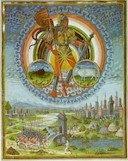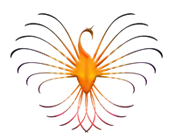
![]()
Historically, Mars was called the lesser malefic and Saturn the greater malefic. Mars was associated with conditions with dramatic symptoms such as fever, inflammation, pain, and bleeding; Saturn ruled chronic diseases whose onset usually began years before anything clinically detectable was noted.
 The
best example of an acute illness is probably the plague. The Black
Death stalked Europe and Asia for three hundred years. When it
swept through a town or village, it left countless victims in its
wake the way a cholera epidemic does in some underdeveloped areas
of the world today.
The
best example of an acute illness is probably the plague. The Black
Death stalked Europe and Asia for three hundred years. When it
swept through a town or village, it left countless victims in its
wake the way a cholera epidemic does in some underdeveloped areas
of the world today.
The onset of an acute disease is usually sudden. If one survives, one is seldom the worse for wear afterwards; but, of course, the fear that is instinctual in the psyche is that one may not survive or that those one loves may not survive.
Not all Mars-ruled conditions are infectious. Bleeding due to accidents or injuries is also "acute," but the common denominator is the sudden onset. There is also generally a need for swift response to effect damage control and minimize long-term consequences.
Mars
In general, there is a tendency to blame someone "outside" for suffering caused by Mars. The perpetrator could in such instance be an invisible microorganism, a knife or scalpel, a bite by a venomous or angry creature such as a spider or dog, or someone else's reckless driving. Only rarely is one "responsible" for one's own Mars injuries: a bruise or fracture sustained in sports would appear to be the exception; but, in reality, there is always some element of competition with Mars. There is an enemy. The enemy may be bacterial or political, or it could be an athletic opponent, this whether one is competing to win or merely to test one's own prowess against some hidden measure one has inside oneself.
Not surprisingly, if there is an enemy, it is fair to wage war, and we have not only seen countless victims of military violence but also wars on alien organisms that require larger and larger arsenals to eliminate smaller and smaller enemies. It is even fair to say that because of the Mars overlay on acute conditions of all types, medicine uses a lot of language that sounds strangely similar to that used by armed forces.
Since the unethical triumph of Pasteur in the late 19th century, the war against illness has largely been focused on minute organisms, but what is ignored by the exponents of the germ theory is the individual differences that make for survival. The question of who succumbs and why and how they differ from those who survive is not addressed. The germ is therefore viewed as causative, and the more that is known about the germ, the more specific are our weapons against it.
If the germ were a bullet, it would make sense that a direct hit would have the same terminal effect on all infected; but germs are not, in fact, like bullets so the military analogies have limited relevance to medicine.
Saturn
![]() Father
Time is opposite to Mars in that the blame for illness must be
placed on the individual sufferer. To make this very clear, germs
are not responsible for high cholesterol or obesity or diabetes
or cancer, therefore the patient must be the cause of his or her
own misery. You can see where this argument is heading. If the
victims of Mars are innocent because an enemy caused the condition,
those suffering from chronic illnesses must be guilty of some sin
to have brought so much misery upon themselves.
Father
Time is opposite to Mars in that the blame for illness must be
placed on the individual sufferer. To make this very clear, germs
are not responsible for high cholesterol or obesity or diabetes
or cancer, therefore the patient must be the cause of his or her
own misery. You can see where this argument is heading. If the
victims of Mars are innocent because an enemy caused the condition,
those suffering from chronic illnesses must be guilty of some sin
to have brought so much misery upon themselves.
Therefore, "official medicine" from centuries ago has tended on the whole to ignore chronic illnesses and to wage war on acute ones. Mars miseries raise passions, but Saturn ones tend to breed judgment, depression, and feelings of helplessness.
Saturn has dominion over diseases that "mature" from inconspicuous to serious over time. The easiest way to understand this is with the examples already cited. Cholesterol may be one or two points above what is ideal and/or one could be just a few pounds overweight but ten or twenty years down the road, five or ten could be twenty or forty. Since Saturn reveres discipline, the excess is regarded with puritanical disdain: overindulgence, laziness, lack of exercise are to blame. I.e., medical science cannot be expected to be effective if patients lack dietary discretion or fail to work out in gymnasiums.
True or False?
The truth from an astrological perspective is different again. Each individual has more or less capacity to express Mars or Saturn. The malefic influences are hence dependent on the skill one has in utilizing either planet adequately.
For example, if one is able to run a high fever and destroy germs through febrile reactions, this would be one explanation for success or defeat in the face of an epidemic. Contrariwise, one might have greater defenses, thicker cell membranes, higher immunity, or more water to pacify fire? To detoxify the body of infection, one needs strong white blood cells (water) and efficient metabolism (fire) and elimination.
Likewise, the issue with Saturn is also balance. Obviously, great restraint and denial of pleasure would curb the tendency to accumulate fats and sugars, but efficient metabolism works here also since a lot of gastric foment and insulin would more or less obviate the risks of a certain amount of injudiciousness.
The Mars-Saturn scales tip other directions as well. If Mars is suppressed through reluctance to express oneself spontaneously, refusal to compete, or denial of spontaneity, acute responses are rendered inactive. The first line of assault is thus surrendered, and we could argue valiantly that it is surrendered to Saturn's more calculating and cautious modus operandi. This means that the immediate agenda is deferred until it cannot be ignored any longer and an acute condition goes underground where it metamorphosizes into a chronic condition. Ironically, when the chronic condition reaches what might be called "critical mass," it erupts with more Mars-like symptoms: pain, inflammation, and perhaps even fever.
![]()
To be continued . . . subscribe below if you wish to be notified when the sequel to this article is posted.
See
also the article on Venus and Mars ![]()
| The Elements: Constitutional Type and Temperament |
|
 |
The elements are one of the four cornerstones of Ingrid's system of medical astrology. Like the ancient Greeks and Indians, Ingrid sees the elements as the constituents of the material world, the world of form. However, the elements are distinguished by vibration, not only rate and density, but also nuance. The physical and psychological characteristics of fire, earth, air, and water are discussed in detail as are the protocols for harmonizing the elements.
|
Psychology
and Spirituality || Venus-Mars
Storks and Stars || Monastic
Moon || Fire: The Power to Change
Laboratory vs. Clinical Medicine || Weight || Lunar
Herbs
Constitutional Type || Soaring
Spirit with Tears
Sleeping Woman ||
Ego Light and Loving Light || Medicine
Name
Questionnaire for Constitutional Balance

Poulsbo, Washington
Copyright by Ingrid Naiman 2007 and 2014